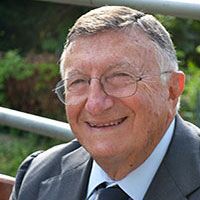Scientific Program

Giulio Tarro
Foundation de Beaumont Bonelli for cancer research
Italy
Title: Tumor liberated protein (TLP) as potential vaccine for lung cancer patients
Biography:
Giulio Tarro graduated from Medicine School, Naples University in 1962. He worked as Research Associate at Division of Virology and Cancer Research, Children’s Hospital from 1965-1968, and Assistant Professor of Research Pediatrics College Medicine from 1968-1969, Cincinnati University, Ohio (Oncological Virology). He has been the Professor at Naples University from 1972-1985, the Chief Division Virology from 1973-2003, the Head Department Diagnostic Laboratories from 2003-2006. Since 2007 he has been the Chairman Committee of Biotechnologies and Virus Sphere, World Academy Biomedical Technologies, UNESCO, the Adjunct Professor Department Biology, Temple University, College of Science and Technology, Philadelphia and the recipient of the Sbarro Health Research Organization lifetime achievement award (2010). His researches have been concerned with the characterization of specific virus-induced tumor antigens, which were the "fingerprints" left behind in human cancer. Achievements include patents in field; discovery of Respiratory Syncytial Virus in infant deaths in Naples and of tumor liberated protein as a tumor-associated antigen, 55 kilodalton protein overexpressed in lung tumors and other epithelial adenocarcinomas
Abstract
Previous studies have investigated the potential role of blood-based tumor markers for early detection, diagnosis, prognostication, post-operative follow-up as well as monitoring of tumor burden and response to treatment in advanced disease stages. To date, the most commonly used markers include neuron specific enolase (NSE), carcinoembryonic antigen (CEA), cytokeratin 19 fragments (CYFRA 21-1) and cancer antigen CA 125 (CA 125). However, low sensitivity, specificity or reproducibility limit their clinical utility in the care of patients with lung cancer and no single marker has gained widespread acceptance as diagnostic test, prognostic indicator or monitor of treatment response. Ideally, a tumor marker should have a sensitivity and specificity of 100%, a goal that is almost never achieved. In 1983, a tumor-associated antigen was isolated from NSCLC and named tumor liberated protein (TLP). The immunohistochemical analysis revealed a cytoplasmic localization of TLP in small and larger granules. In some specimens it was also detected in the lumen of atypical glands and in the bronchial secretions, suggesting that TLP could be considered a secretory product of neoplastic cells. Tarro et al. have demonstrated that when TLP is extracted from a patient’s tumor, purified in the laboratory and reintroduced into the body, it boosts an immune response in the host. The partial sequence analysis of this protein led to the synthesis of corresponding antigenic peptides that have been used to produce antisera in rabbits. According to Tarro et al., four TLP-derived peptides were identified: RTNKEASI, GSAXFTN, QRNRD and GPPEVQNAN. Anti-RTNKEASI rabbit sera reacted specifically with NSCLC tumor extracts as well as sera from lung cancer patients. TLP was detected in sera of 53.1% of NSCLC patients (N = 534) with 75% being positive in the early stage (stage I) dropping to 45% in the late stage (stage IV), suggesting a potential role as early screening biomarker.
- Antibiotic Therapy
- Antibiotic Resistance & Prevention
- Pharmacology of Antibiotics
- Applications of Antibiotics
- Antibiotics for emerging & Re-Emerging Diseases
- Antibiotics in Oncology
- Interaction & Side Effects of Antibiotics
- The Next Generation Approach of Antibiotics
- Genetics of Antimicrobial Resistance
- Alternative to Antibiotics

